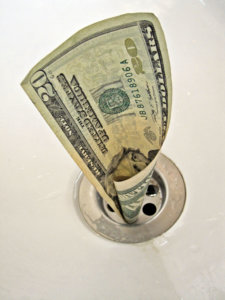
Every year, the nation’s largest banks pull in billions of dollars from bank fees that could have easily been avoided by the account holder. While each of these fees may be a nominal amount for a single instance, over the course of a year they could add up to hundreds of dollars drained from your bank account for reasons that probably brought you no benefit. Here are some of the most insidious fees to watch out for and how you can avoid them.
Account Maintenance Fees
There is no bank fee more annoying than the account maintenance fee. These fees are charged simply for the privilege of having your money in an account at the bank of your choice. Most banks will waive this charge each month if you meet certain requirements, such as maintaining a minimum balance in the account, having direct deposits of more than $500 monthly, or using the debit card connected to the account a certain number of times within the statement period. It is important to know what these requirements are before opening the account and you should only open the account if you are confident that you can meet the requirements to have the account maintenance fee waived each month.
Stop Payment Fees
If you need to cancel or place a hold on a payment, many banks offer a stop payment service that will prevent the funds from being taken out of your account. However, this convenience comes at a significant cost, often around $30 per occurrence. Many people also fail to realize that the payment is only stopped for a specific period of time, typically six months, after which the stopped payment can still go through. To ensure that the payment is not made, another stop payment order must be issued before the expiration of the first order, which will incur an additional fee. While a stop payment order is a quick and effective method to prevent a payment from processing, you may spend more in fees for the order than the original payment was for.
Deposit Item Returned Fee
If you are given a check for payment and the check bounces after being deposited in your account, you may be charged a deposit item returned fee by your bank that will be deducted from your account balance. Even though the check bouncing is not your fault, you are still liable for paying the fee for the check not being honored. To avoid this problem, ask for any payments coming from friends, family members, or from services you provided to be made in cash or by money order instead of accepting checks.
